
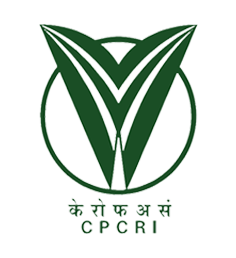
1. Chowghat Orange Dwarf
This is an early flowering cultivar and takes about 3-4 years for initial flowering. The average annual yield is 112 nuts/palm/year. It is best suited for tender nut water. This cultivar was released by ICAR-CPCRI in 1991 for cultivation as tender nut variety.

Chowghat Orange Dwarf
2. Kalpasree
Kalpasree has superior quality of coconut oil, very sweet tender nut water and meat and is resistant to root (wilt) disease. This is the earliest flowering cultivar and takes about 2.5 to 3 years for flowering. It is tolerant to root (wilt) disease. The mean annual yield is 90 nuts/palm with a copra content of 96.3g/nut. This variety is released for cultivation inroot (wilt) prevalent areas of Kerala.

Kalpasree
3. Kalpa Jyothi
Dwarf variety with yellow fruits, higher average yield of 114 nuts per palm per year with estimated copra yield of over 16 kg per palm per year. Recommended for cultivation in Kerala and Karnataka for tender nut purpose.
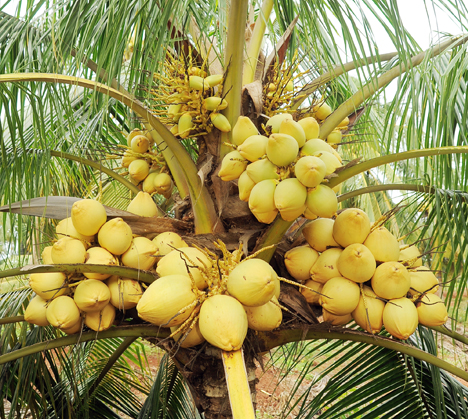
Kalpa Jyothi
4. Kalpa Surya
Dwarf with Orange fruits recommended for cultivation in Kerala, Karnataka and Tamil Nadu for tender nut purpose. The average yield is 123 nuts per palm per year with estimated copra out turn of 23 kg per palm per year.
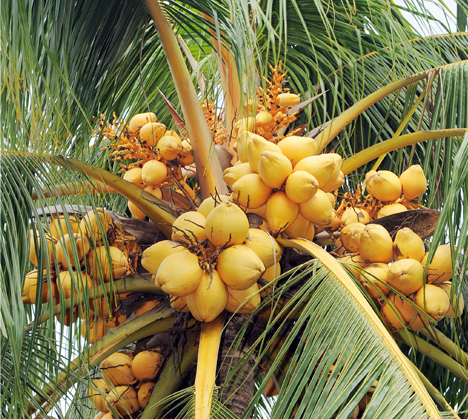
Kalpa Surya
5. Kalparaksha
This is a semi tall variety with sweet tender nut water and with higher resistance to root (wilt) disease of coconut. It comes to flowering by 54 months from planting. Its annual yield is 87 nuts/palm, 16.38 kg copra/palm and 10.65 kg oil/palm. In root (wilt) disease affected tracts, it gives an annual yield 65 nuts/palm. The quantity of tender nut water is 290ml. This is released as a variety for tender nut and for cultivation in root (wilt) prevalent areas of Kerala.
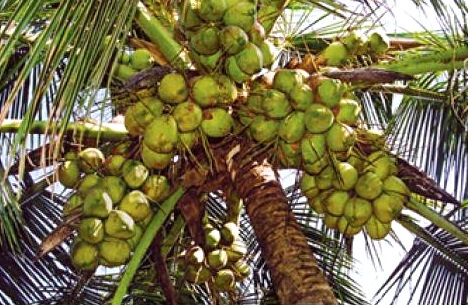
Kalparaksha
6. Kalpa Suvarna
Kalpa Suvarna dwarf coconut variety is a selection, suitable for dual purposes for copra and tendernut production, gives an average yield of 97 nuts/ palm/ year and 17,169 nuts per hectare per year. The palms are regular bearers and commence flowering after thirty to thirty-six months of planting in the field. Quantity of tender nut water is around 431 ml and very good in taste with TSS of 5.8 °Brix. The variety is recommended for the states of Karnataka and Kerala.
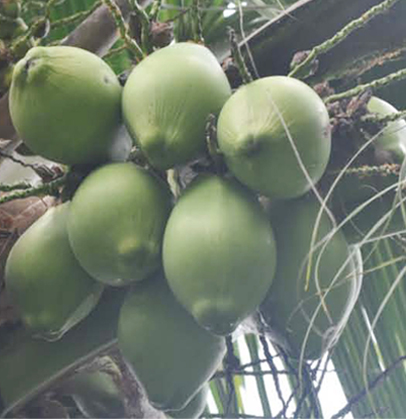
Kalpa Suvarna
Tall varities
7. Chandra Kalpa
The average annual yield is 100 nuts/palm. The palm grows in all types of soil and it can withstand moisture stress. This cultivar is recommended for cultivation in the states of Kerala, Karnataka, Andhra Pradesh and Maharashtra.
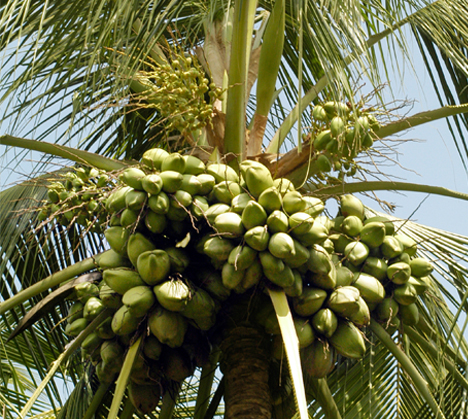
Chandra Kalpa
8. Kerachandra
The annual average yield is 110 nuts/palm. This is recommended for the west coast region including Kerala, Konkan, coastal Andhra Pradesh and West Bengal.
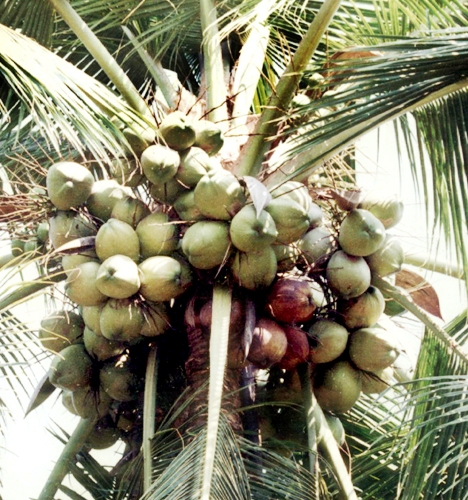
Kerachandra
9. Kalpa Pratibha
This variety has the potential to produce 23,275 nuts per hectare per year. The quantity of tender nut water is 448 ml. This is recommended for cultivation in Kerala, Maharashtra, interior zone of Tamil Nadu and coastal zone of Andhra Pradesh
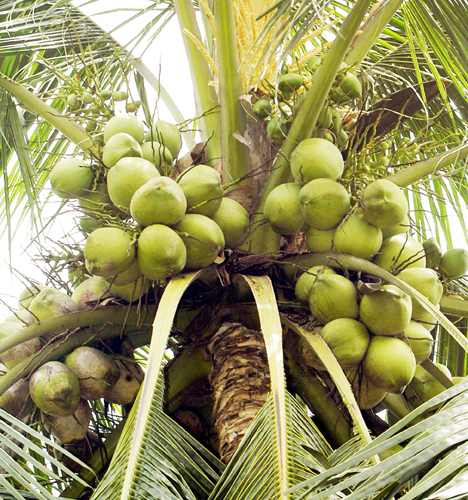
Kalpa Pratibha
10.Kalpa Dhenu
It commences flowering in 67 months after planting in the field. This variety has the potential to produce 22,794 nuts per hectare per year. The quantity of tender nut water is 290 ml. This is recommended for cultivation in Kerala, East Coast region of Tamil Nadu, Andhra Pradesh and Andaman & Nicobar Islands.
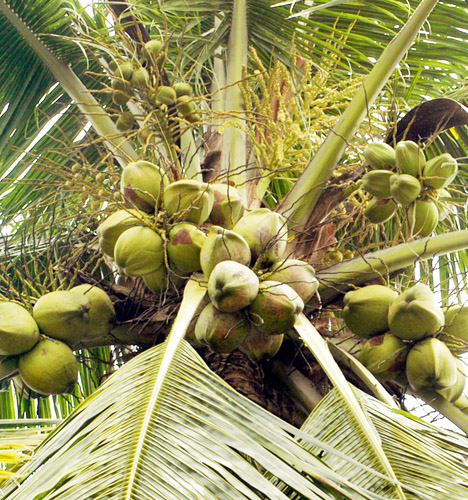
Kalpa Dhenu
11. Kalpa Mitra
This variety has the potential to produce 80 nuts/palm/year. The quantity of tender nut water is 495 ml. This is recommended for cultivation in Kerala and West Bengal.
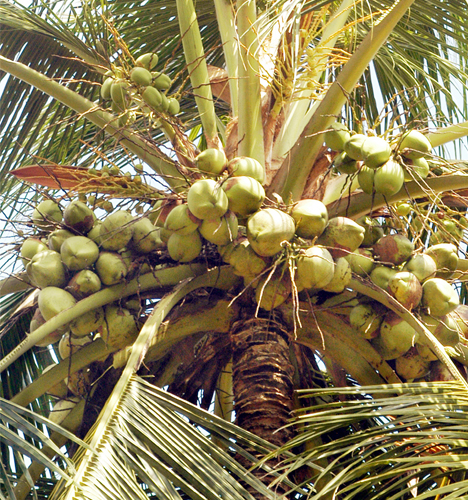
Kalpa Mitra
12. Kalpatharu
This variety is recommended for ball copra production. It yields around 116 nuts per palm per year with copra content of 176g, under rainfed situations. This is recommended for cultivation in Karnataka, Kerala and Tamil Nadu.
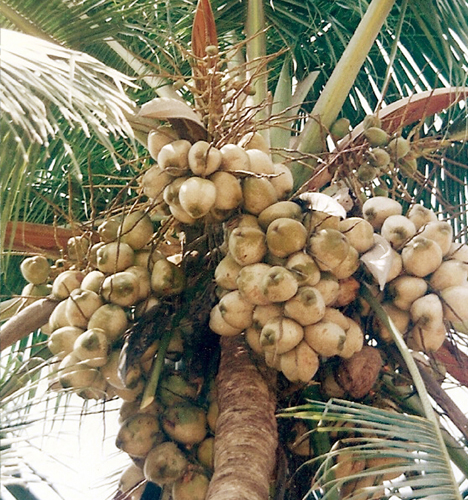
Kalpatharu
13. Kera Keralam
The average annual yield under rainfed condition is 109 nuts per palm. The fruits of the variety weigh about 800- 900 g and copra content of 176 g/nut, with copra oil content of 68%. Suitable for ball copra production. It is recommended for large scale commercial cultivation in the states of Tamil Nadu, Kerala and West Bengal.
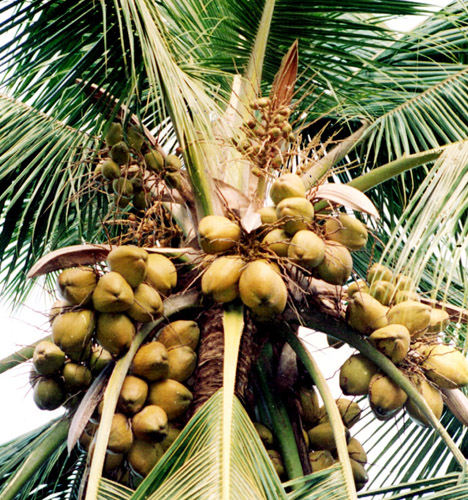
Kera Keralam
14. Kalpa Haritha
A superior high yielding tall selection with lesser incidence of eriophyid mite infestation. The average nut yield is 118 nuts per palm per year under rainfed conditions with estimated copra yield of 25.5 kg per palm per year. This variety is suitable for copra and tender nut purpose. Recommended for Kerala and Karnataka
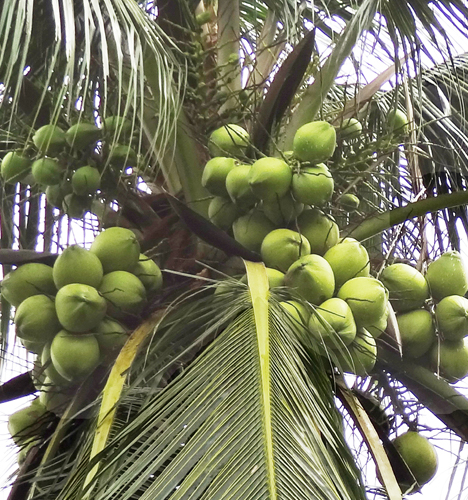
Kalpa Haritha
15. Kalpa Shatabti
The variety gives high copra outturn of 28.65 kg per palm per year or 5.01 t/ ha copra. The variety is characterized by large fruits with average copra content of 272.9 g and higher volume (612 ml nut-1) of good quality tender nut water and gives an average nut yield of 105 nuts per palm per year. Recommended by for cultivation in the coconut growing tracts of Kerala, Karnataka and Tamil Nadu.
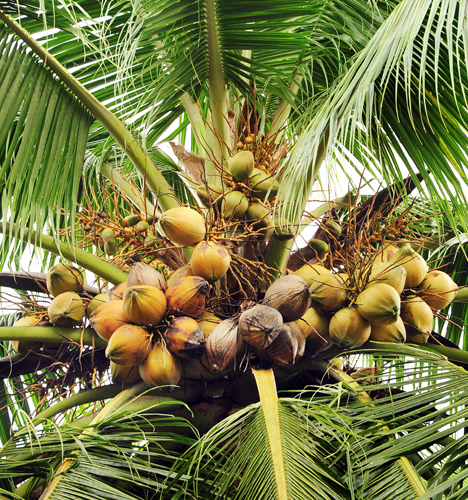
Kalpa Shatabti
16. Kalpa Ratna
A high yielding variety suitable for tender nut, copra and inflorescence sap production. The annual average nut yield is 133 nuts per palm per year, with copra out turn of 24.47 kg per palm per year. Recommended for Kerala, Tamil Nadu
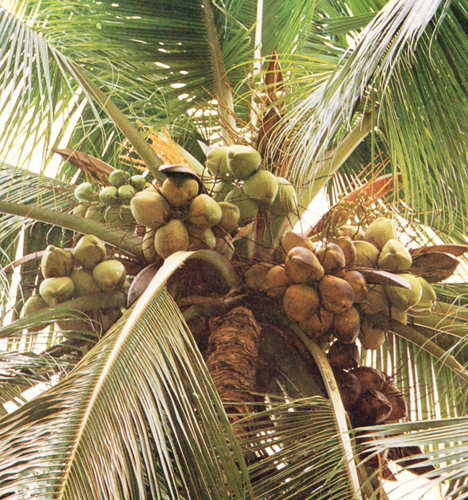
Kalpa Ratna
17. Kalpa Vajra
A tall variety, WCT X WCT progenies, based on performance evaluation trials at CDB Farm, Neriamangalam and ICAR-CPCRI, RS, Kayamkulam, were high yielding and root (wilt) disease-free West Coast Tall (WCT) palms, superior in terms of higher yield and recorded less root (wilt) disease incidence and recommended for release as ‘Kalpa Vajra’, suitable for cultivation in root (wilt) disease prevalent tract.
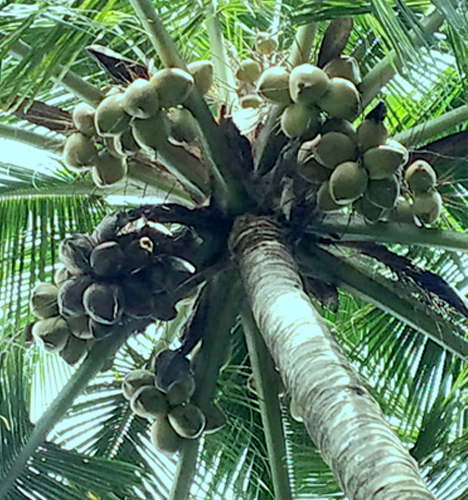
Kalpa Vajra
Hybrids
18. Chandra Sankara
It is a cross between COD with WCT. The palms come to bearing early when compared to tall palms. It is a heavy yielder and produces 116 nuts/palm with a range of 100-150 nuts. The copra content in nut is 160-230 g. It is susceptible to drought and hence irrigation is required during summer months. Chandrasankara was released by ICAR-CPCRI in 1985 for cultivation in Kerala and Karnataka
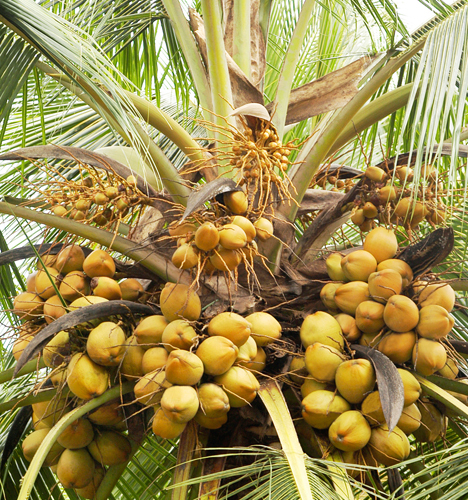
Chandra Sankara
19.Chandra Laksha
It is a hybrid between LCT X COD. The hybrid palm comes to bearing in about 4- 5 years after planting. The annual yield is 109 nuts/ palm with a copra content of 150-210g/nut.
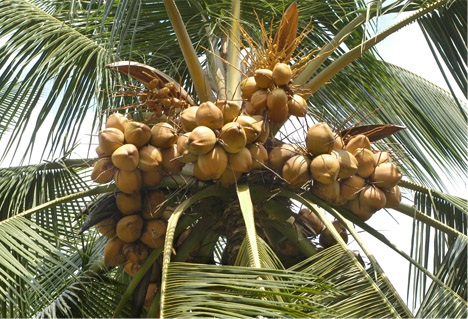
Chandra Laksha
20.Kera Sankara
It is a hybrid between WCT and COD. The palm comes to bearing by the fourth year of planting. The mean annual yield of nuts is 108 with a range of 70-130 nuts. The copra content is 187g/nut. This hybrid was released by ICAR-CPCRI in 1991, for large scale cultivation in Kerala, coastal Andhra Pradesh and coastal Maharashtra.
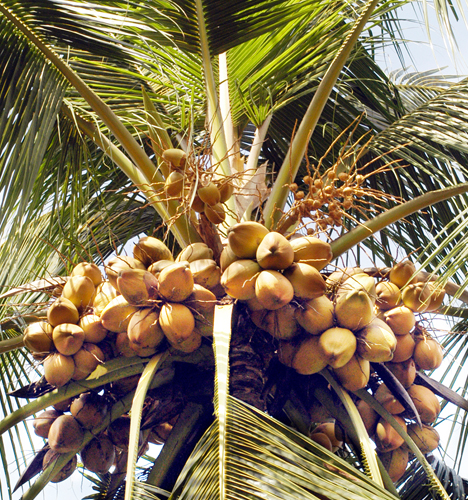
Kera Sankara
21.Kalpa Samrudhi
It is a hybrid between MYD and WCT. The mean annual yield is 117 nuts per palm. The copra yield is 4.38 t/ha and oil is 3.04 t/ha. The hybrid is suitable for tender nut purpose. This hybrid was recommended for cultivation in Kerala and Assam.
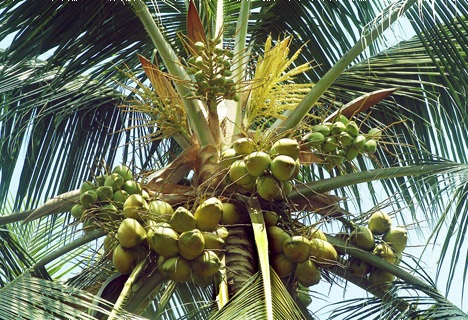
Kalpa Samrudhi
22. Kalpa Sankara
It is a hybrid between root (wilt) diseasefree Chowghat Green Dwarf and root (wilt) disease-free West Coast Tall. The mean annual yield is 85 nuts per palm. The copra yield is 2.5 t/ha and oil is 1.69 t/ha. This hybrid was recommended for cultivation in root (wilt) disease prevalent tracts of Kerala
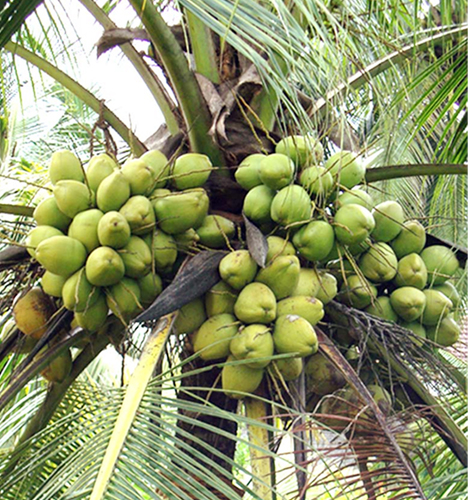
Kalpa Sankara
23. Kalpa Sreshta
It is a high yielding, hybrid involving MYD and TPT. The mean yield is 167 nuts/palm/year, with estimated high copra out turn of 35.9 kg/palm/year or 6.28t/ha copra. The hybrid is suitable for tender nut purpose. This hybrid is recommended for cultivation in Kerala and Karnataka States.
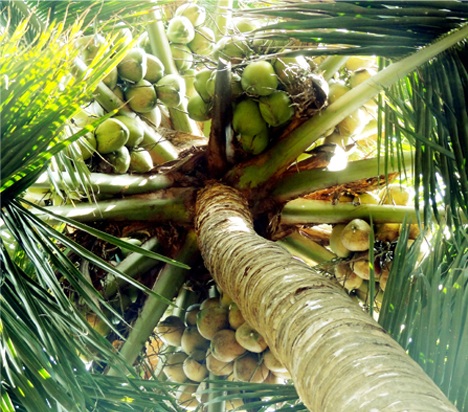
Kalpa Sreshta
Arecanut
Tall Varieties
Sumangala:
It is a tall type with partially drooping crown. Under good management, palms flowers in 4-5 years. The colour of the ripe nuts is deep yellow to orange and oblong to round in shape. The variety recorded an average yield of 3.28 kg chali/palm/year. This variety is recommended for Coastal Karnataka and Kerala.
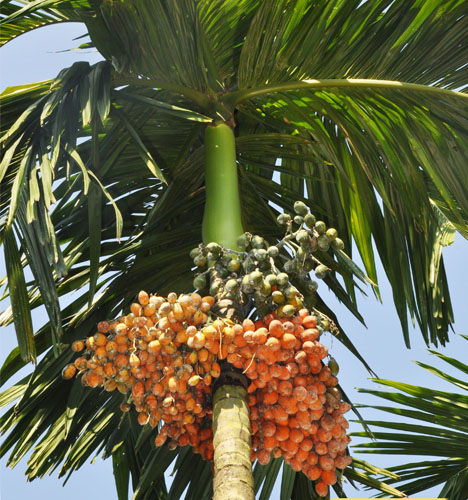
Sumangala
Sreemangala:
The palm is tall with partially drooping crown with longer internodes and sturdy stem. It starts flowering in 4-5 years. It is high yielder with an average chali yield of 3.18 kg per palm per year. Ripe nuts are usually oblong to round in shape with deep yellow colour. This variety is recommended for coastal areas of Karnataka and Kerala.
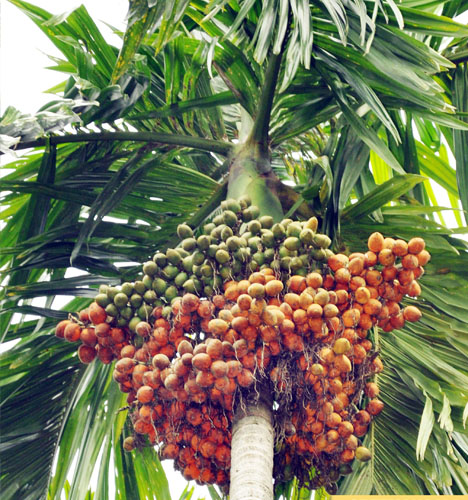
Sreemangala
Swarnamangala:
It is a tall high yielding variety with homogeneous population. Nuts are bigger and heavier with high recovery of chali or dry kernel. Average yield of this variety is 3.88 kg chali/ palm/year. It is recommended for cultivation in Karnataka and Kerala.
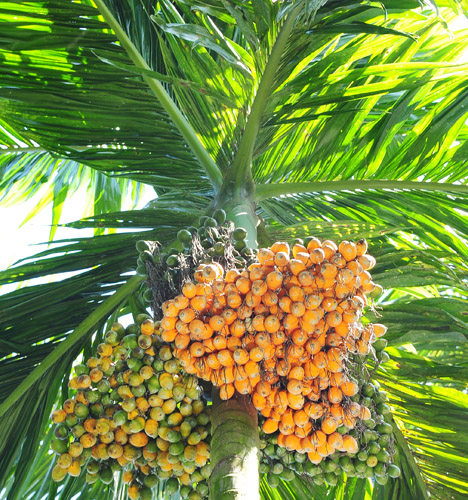
Swarnamangala
Mohitnagar:
Mohitnagar was released for commercial cultivation during 1991. The important feature of this variety is its greater uniformity. The bunches are well placed and nuts are loosely arranged on spikes which help in their uniform development and also enable efficient plant protection measures. The variety is consistently high yielder with an average chali yield of 3.67 kg/palm/year. This variety is recommended for West Bengal and coastal areas of Karnataka and Kerala.
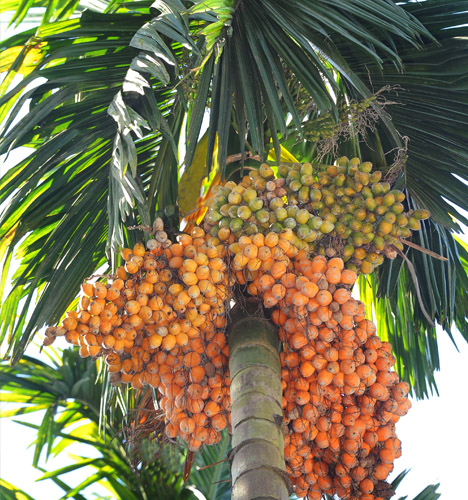
Mohitnagar
Kahikuchi Tall
The variety is high yielding with medium thick stem, longer internodes, partially drooping crown, homogeneous population, regular bearer, consistent in yield, bunches are well placed on the stem, orange colour, bold and round shaped nuts, high recovery of chali from fresh nuts, comes to bearing by 5th year. The variety is consistent high yielder with an average chali yield of 3.70 kg /palm/year. The variety, released during 2009, has been recommended for commercial cultivation in Assam and Meghalaya.
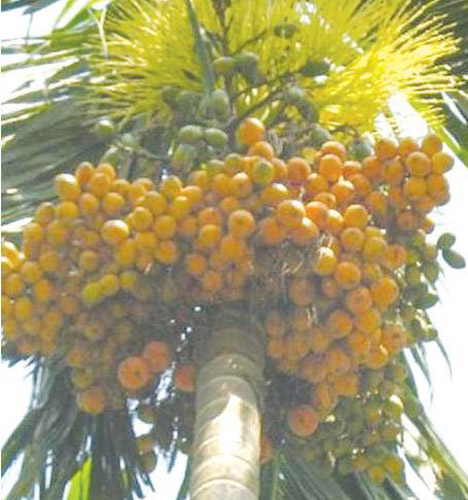
Kahikuchi Tall
Madhuramangala:
The yield performance of the variety is higher than the released varieties viz., Mangala, Sumangala, Sreemangala and traditional local types, suitable for both tender nut and ripe nut processing. Also fetches higher price in the market because of its quality and marble appearance of the split nut. The average yield is 2.95 kg dry tender processed nuts/palm/year or 3.54 kg dry kernel/palm/year. The variety has been recommended for commercial cultivation in Karnataka and Maharashtra.

Madhuramangala
Nalbari:
The yield performance of the variety is higher as compared to all the earlier released varieties and found suitable for ripe nut processing. The variety possesses high yielding nature, tall type with medium thick stem, longer internodes, partially drooping crown, homogeneous population, regular bearer, consistent in yield, bunches are well placed on the stem, round shaped yellow colour nuts, high recovery of dry kernel from fresh nuts, comes to bearing by 5th year. The average yield is 4.15 kg dry kernel/palm/year. The variety has been recommended for release during 2014 for cultivation in Karnataka, West Bengal (North Bengal) and North East.
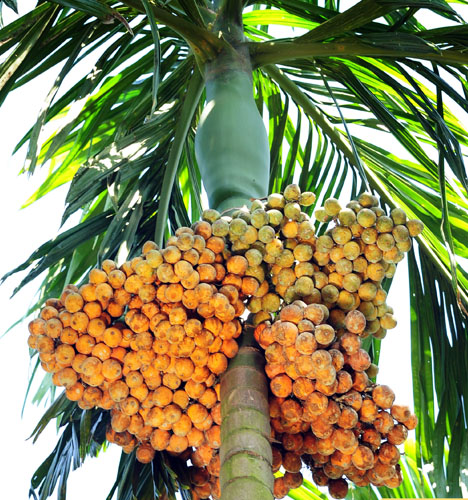
Nalbari
Semi Tall Varieties
Mangala:
This variety possesses characters such as earliness in bearing, more number of female flowers per inflorescence, higher nut set, quicker stabilization of production and lesser height in comparison with S.K. Local variety, average yield is 2.90 kg chali/palm/year. The variety was released in the year 1972 for coastal areas of Karnataka and Kerala
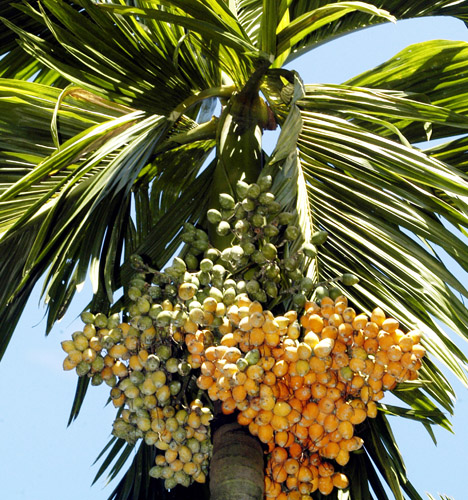
Mangala
Shatamangala:
High yielding arecanut variety released during 2016. The yield performance of the variety is higher than the released varieties viz., Mangala, Sumangala, Sreemangala and traditional local types, suitable for both tender nut and ripe nut processing. The average yield is 3.26 kg dry tender processed nuts/palm/year or 3.96 kg dry kernel/palm/year. The variety has been recommended for commercial cultivation in Karnataka and Gujarat.
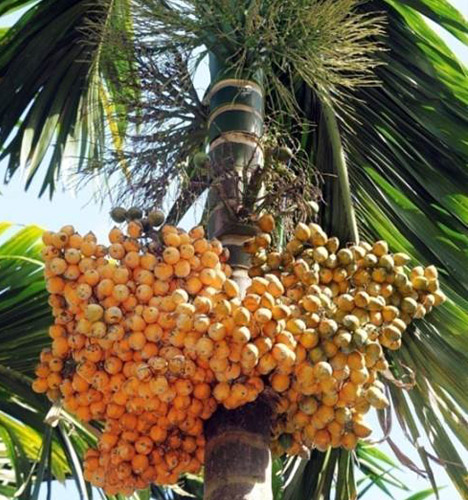
Shatamangala
Dwarf hybrids
VTLAH -1: Vittal Arecanut Hybrid-1 (HD × Sumangala)
This hybrid is dwarf in nature. Sturdy stem with super imposed nodes, reduced canopy size, well spread leaves, partial drooping crown, medium sized oval to round and yellow-orange colored nuts, early stabilization in yield and high recovery of chali are the striking features of this hybrid. The average chali yield of this hybrid is 2.54 kg/palm/year. Released for commercial cultivation in Karnataka.
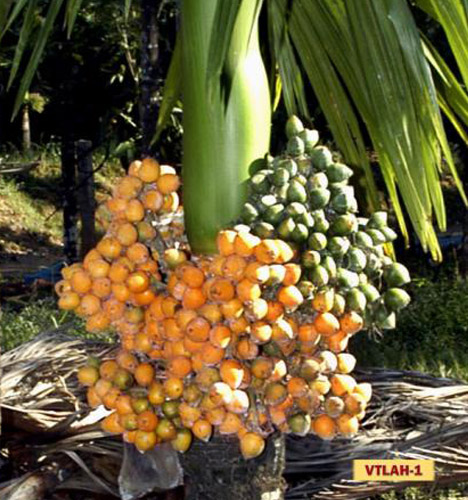
VTLAH -1
VTLAH -2: Vittal Arecanut Hybrid-2 (HD × Mohitnagar)
Vittal Arecanut Hybrid-2 is dwarf in nature. Medium thick stem with super imposed nodes, reduced canopy size, well spread leaves, drooping crown, medium sized oval nuts, early stabilization in yield and high recovery of chali are the other features of this hybrid. The average chali yield of this hybrid is 2.64 kg/palm/year. Released for commercial cultivation in Karnataka.
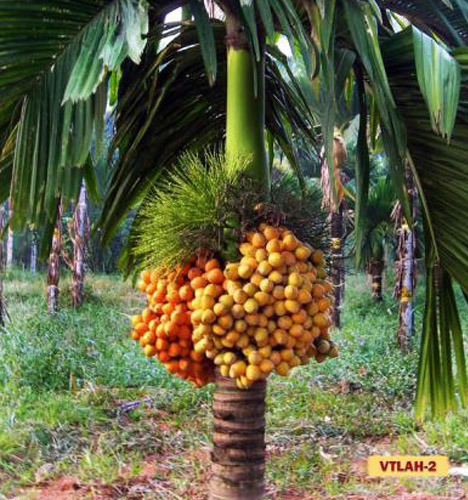
VTLAH -2
Cocoa
VTLCC-1
Vittal Cocoa Clone 1
This clone is early and heavy bearer. It is both self and cross compatible clone. Green to yellow pods: 75/tree/year. No. of beans/pod: 36. Single dry bean weight: 1.05 g. Shelling: 12%, Fat content: 52.5%. Dry bean yield: 1.33 kg/tree/year, 911 kg/ha
VTLCS-1
Vittal Cocoa Selection 1
Precocious, stable and high yielder both under arecanut and coconut with medium canopy, withstands biotic and abiotic stress. Red to Orange pods: 54.5 / tree/ year No.of beans/ pod: 42 Single dry bean wt: 1.13 g Shelling: 11%, Fat- 52.1%, Dry bean yield/ tree/ year: 2.52 kg/tree/year, 1700 kg/ha
VTLCS-2
Vittal Cocoa Selection 2
This selection is early, stable and high yielder both under arecanut and coconut. It has bold and bigger beans, less incidence of pests and diseases. Green to Yellow pods: 55 /tree/year No. of beans/ pod: 42 Single dry bean wt: 1.21 g Shelling: 15%, Fat: 53% Dry bean yield: 2.7 kg/ tree/ year, 1850 kg/ha
VTLCH 1
Vittal Cocoa Hybrid 1
The VTLCH 1 cocoa, is a hybrid early bearing, high yielding with an average of 50 pods/tree/year. Pods are of 350-400 g and recorded average yield was 1.5 kg dry beans/tree/year. The variety is recommended for the states of Kerala, Karnataka, Tamil Nadu and Andhra Pradesh.
VTLCH-2
Vittal Cocoa Hybrid 2
The variety VTLCH-2 is a hybrid, early bearing, high yielding with average of 50 pods/tree/year. Pods are of 350-400 g weight with an average yield of 1.5 kg dry beans/tree/year. This variety is tolerant to black pod rot, tea mosquito bug, low moisture stress and adapted to different agro climatic conditions of Karnataka, Kerala, Andhra Pradesh and Gujarat.
VTLCH-3
Vittal Cocoa Hybrid 3
This hybrid is suitable for rainfed & irrigated areca and coconut gardens of Karnataka, Kerala, Tamil Nadu and Andhra Pradesh. Green to yellow pods: 45/tree/year. No. of beans/pod: 43 Single dry bean weight: 1.07 g. Shelling: 13%, Fat content: 52 Dry bean yield: 1.45 kg/tree/year, 993 kg/ha
VTLCH-4
Vittal Cocoa Hybrid 4
This hybrid is suitable for rainfed & irrigated areca and coconut gardens of Karnataka, Kerala, Tamil Nadu and Andhra Pradesh. Red to orange pods: 40/tree/year. No. of beans/pod: 43 Single dry bean weight: 1.01 g. Shelling: 12%, Fat content: 53% Stomatal resistance (s/cm): 2.41. Dry bean yield: 1.25 kg/tree/year, 856 kg/ha.
VTLCH-5
Vittal Cocoa Hybrid 5 (NETHRA CENTURA)
This hybrid is suitable for palm based cropping systems of Karnataka, Kerala, Tamil Nadu and Andhra Pradesh and for high density planting. Green to yellow pods: 66/tree/year. No. of beans/pod: 43 Single dry bean weight: 1.11 g. Shelling: 11%, Fat content: 52% Dry bean yield: 2.5- 3.0 kg/tree/year, 1800- 2000 kg/ha.